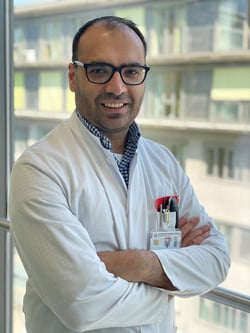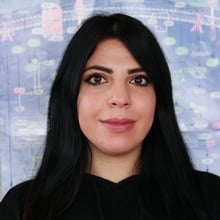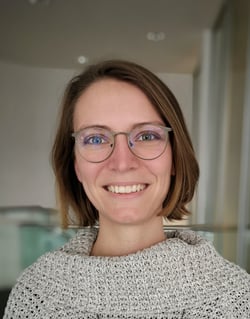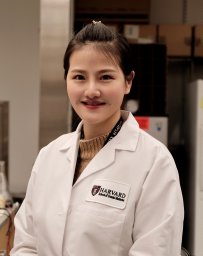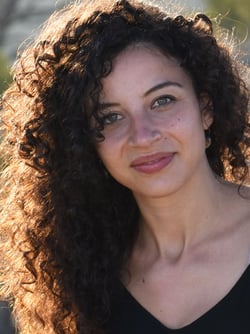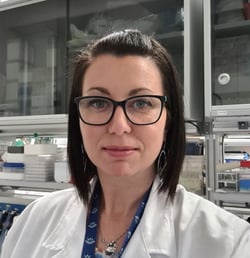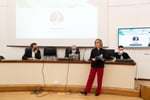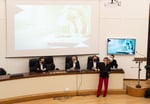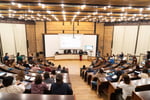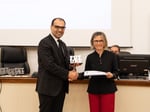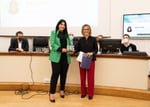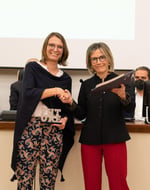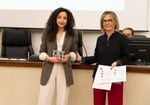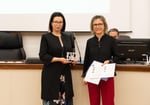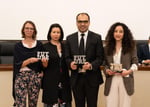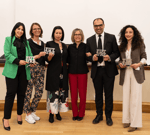For the ninth edition of the Fellowship annual program, IBSA Foundation offers 6 fellowships of €30,000 each in the following research fields: dermatology, endocrinology, fertility/urology, pain medicine/orthopaedics/rheumatology and two for the special edition regenerative medicine.
A total of 160 candidates, (105 women and 55 men) from 23 countries have submitted their projects.
The award ceremony opened the forum "New Frontiers in Regenerative Medicine", on the theme of regenerative medicine.
The forum, organised by the Medical Academy of Rome in collaboration with IBSA Foundation for scientific research, aims to bring together the scientific community with scientists and scholars experimenting with increasingly innovative technologies to repair and/or replace irreparably compromised organs and tissues. The biological properties of the various stem cell populations, the role of the tissue niche in tissue repair and strategies for maintaining the functional state of a tissue were discussed during the forum.
Below you can find the names of the six winners, the title and the description of their works:
Winners
Dermatology: Alpaslan Tasdogan
Department of Dermatology, University Hospital Essen, Germany
Project title: Targeting T Cell Metabolism for Improvement of Cancer Immunotherapy in Human Melanoma Patients
In recent years research focused on immune metabolism that has shown promising indications for modulating metabolic targets to regulate anti-cancer immunity. However, it is still not clear how the tumor microenvironment (TME) in cancer patients confers immune cell function during therapy. We will take a further step towards translational research and study immune and melanoma cell metabolic interactions in melanoma patients.
The TME is known to shape immune cell function before and during therapy, we will dissect this metabolic plasticity in order to identify novel metabolic modulators that are able to boost anti-cancer function of immune cells during immunotherapy and to overcome therapy resistance. Solving this problem will change the way we think about cancer/immune metabolism and about how to manipulate it for therapeutic benefit for patients.
Endocrinology: Diana Farhat
Interface de Recherche Fondamentale et Appliquée en Cancérologie U1113 Inserm, Strasbourg, France
Project title: Role of the thyroid hormone nuclear receptor TRα1 in the plasticity of the colon cancer stem cells
Stem cells (SCs) dysfunction and their transformation into Cancer Stem Cells (CSCs) leads to tumour relapse and metastasis. In colorectal cancer (CRC), this dysfunction is promoted by the deregulation of the Wnt, Notch and BMP signalling pathways. In our laboratory, we have strongly contributed to this field by studying the importance of the signal-dependent upon thyroid hormones (THs).
THs act via the nuclear receptors TRs, which are T3-modulated transcription factors. Previous studies of our lab demonstrated that TRα1 up-regulation deregulates Wnt, Notch and BMP pathways and participates in tumour initiation and progression through action on progenitors and on stem cells (SCs). Hence, a better knowledge of the properties and the nature of the TRa1-expressing cells in normal intestinal mucosa and in cancers is needed to better understand how TRa1 participates in the highly complex scenario of cell plasticity and cancer. The final aim is to have new leads for more efficient therapies.
Fertility/Urology: Kathrin Tomasek
Prof. John McKinney, Swiss Federal Institute of Technology in Lausanne (EPFL), Switzerland
Project title: How polybacterial interactions shape urinary tract infections and antibiotic treatment outcomes
This proposed project on "How polybacterial interactions shape urinary tract infections and antibiotic treatment outcomes" is a biomedical problem of the first rank, as urinary tract infections are extremely common; they are a leading cause of human morbidity and mortality worldwide and characterized by high rates of recurrence following seemingly effective antibiotic treatment.
Although polybacterial infections have been linked to more-severe clinical outcomes, there has been surprisingly little work done to elucidate the underlying mechanisms. My proposal aims to address this important and relatively neglected problem. The work I am proposes will not only advance our currently limited understanding of polybacterial infections, it may also point the way to the development of new and better strategies for treating these infections.
Pain medicine/Orthopaedics/Rheumatology: Jun Zhou
Brigham and Women's Hospital, Harvard Medical School, Boston, USA
Project title: Amelioration of osteoarthritis with exogenous circular RNA using hybrid nano-delivery platform
Osteoarthritis(OA) is a leading cause of disability in elderly patients. However, there lacks disease-modifying drugs for the treatment of OA. Recently, messenger RNA (mRNA) has gained popularity but remain unexplored in OA due to challenges in delivery the unstable mRNA. Herein we use exogenous circular RNA (circRNA) to overcome the short half-life of mRNA.
This approach will maximize translation of functional protein from circRNAs Klotho, our target RNA therapy for OA which is the anti-aging hormone and play a crucial role in cartilage homeostasis, to reduce the expression of MMP 13. Efficient delivery circRNAs is achieved by using a bioenginnered hybrid lipid-polymeric nanoparticles (HLP) functionalized with peptide targeting type II collagen when administered by intra-articular injection, which is expected to protect cartilage integrity and overall joint structure in OA.
1st Winner - Regenerative Medicine: Marianna Cosentino
Laboratory of Translational Cardiomyology, Department of Development and Regeneration, Stem Cell Research Institute, KU Leuven, Belgium
Project title: A vascularized muscle engineered tissue (X-MET) as a cardiac patch for myocardial infarction repair
The adult heart shows a poor regenerative capacity after injury. Thus, cell transplantation and tissue engineering approaches have emerged as possible therapeutic options. Several cell populations have been largely used to treat the infarcted myocardium. Nevertheless, the limited ability of transplanted cells to establish functional connections with the host cardiomyocytes cooled the enthusiasm for their clinical use. X-MET, eX-vivo Muscle Engineered Tissue, is a three-dimensional construct that displays several morpho-functional properties of an in vivo muscle.
Preliminary studies demonstrated that mechanical stimuli trigger a functional remodeling of the X-MET toward a myocardial-like structure. Based on these features, this project aims to provide valid proof for the use of X-MET as a useful experimental tool for regenerative medicine, able to restore, maintain, or improve tissue function.
2nd Winner - Regenerative Medicine: Barbara Peruzzi
Bambino Gesù Children’s Hospital IRCCS, Rome, Italy
Project title: Study on the effects mediated by combined mechanical stimulations on the generation of mesenchymal stromal cell-derived-ECM for regenerative medicine
In this project the effects mediated by mechanical conditioning on cell-derived extracellular matrix (CD-ECM) generation will be assessed for patient-tailored tissue engineering applications and regenerative medicine. The rationale behind the project’s working hypothesis is that the biological resemblance of CD-ECMs to their in vivo counterparts and natural complexity provide them with a prevailing bioactivity, thereby providing the opportunity to produce microenvironments with customizable biological and biophysical properties in a controlled setting.
To this aim, human mesenchymal stromal cells (MSCs) will be cultured under combined mechanical stimuli (controlled matrix stiffness + fluid shear stress/vertical vibration mechanical loads) to assess the properties of derived ECM and the feasibility of using mechanically loaded MSC-derived ECM as a platform to improve osteogenic differentiation.
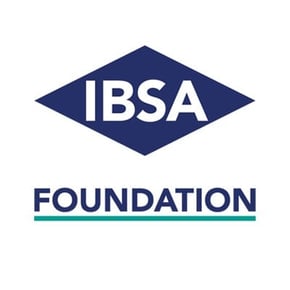
.jpg?width=300&name=IBSA_Cover%20Fellowship_2021_1920x1080px%20(1).jpg)

